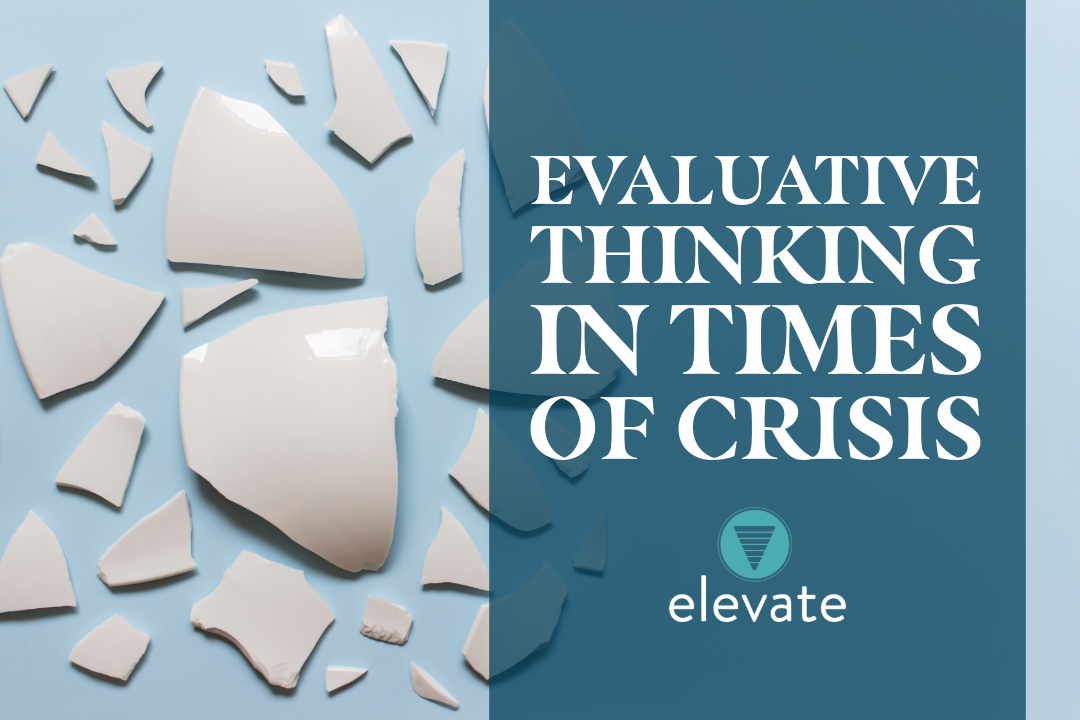Evaluative Thinking in Times of Crisis
Written by Amy Merritt Campbell
Last week, while listening to one of my favorite podcasts, Pantsuit Politics, something that one of the cohosts really stood out to me. She said, “What a ‘pandemic world’ does is accelerate change and clarify problems.”
As an evaluator, facilitator, and community-focused practitioner, I know that to be true of any major crisis. In Nashville alone, we’ve seen a tornado, the onset of COVID-19, and, just recently, storms that knocked out power for over 100,000 households in the city (side note, could we please catch a freaking break?). Through these crises, I’ve seen how change is accelerated and problems are clarified. Conversations around the benefits of remote work have hit the fast track as we’ve had to adapt to social distancing. Challenges like food insecurity and affordable housing have been put in the spotlight in the wake of unprecedented unemployment and a natural disaster that decimated communities throughout our city.
This time of rapid change, reprioritization, and quick decision-making demands that we learn, adapt, innovate, and iterate. As we settle into what looks like the long haul of navigating COVID-19, those of us who have the responsibility of supporting the community must be able to collect information, synthesize it quickly, make meaning, and determine what decisions need to be made in order to adapt to our quickly changing environment. We have to be able to consult available data on whether or not our intervention is having an impact and make necessary adjustments if we hope to be effective in ensuring our friends, families, and neighbors have what they need. Specifically, and more to the point, we must create the ability and the space to learn.
Learning in times of crisis requires seizing opportunities for reflection that include creating spaces to think, slowing down, being mindful and paying attention, creating new patterns of thinking, surfacing alternative interpretations, and creating new theories of action. The field of evaluation - its theories, approaches, and tools - offers ways to support organizations and teams in learning and adapting in this reflective, intentional way. Since the primary purpose of evaluation is to support the improvement of programs, policies, and services, utilizing approaches like evaluative thinking enables us to collect data, pose thoughtful reflection questions, and consider multiple angles before making decisions.
Evaluative Thinking is a “cognitive process in the context of evaluation, motivated by an attitude of inquisitiveness and a belief in the value of evidence, that involves skills such as identifying assumptions, posing thoughtful questions, pursuing deeper understanding through reflection and perspective taking and making informed decisions in preparation for action (Buckley, Archibald, Hargraves, & Trochim, 2015).” As Paul Schmitz says, this requires a commitment on the part of leaders to slow down, ask thoughtful questions, and lean on data and experiential information to “take the balcony view” of a challenging situation. Some strategies for engaging in evaluative thinking include:
Create an intentional learning environment. In a non-COVID-19 world, this might look like a physical space that is conducive to brainstorming, co-creating, and iterating. With the current challenges that exist, this might look like a Zoom meeting or utilizing a tool like Miro to allow your team to collaborate and share ideas.
Establish a habit of scheduling meeting time focused on utilizing this approach. This is perhaps one of the most important strategies to support evaluative thinking, and it’s often the most difficult one to implement. We’re all being pulled in a hundred different directions on any given day, but creating and protecting time to deep-dive into compiling the information available and reflecting on its implications for our work is absolutely critical.
Utilize role-play or other perspective-taking activities to uncover assumptions. Use a method like DeBono’s Six Thinking Hats to examine your conclusions/decisions and identify any potential gaps, assumptions, or misconceptions. Take the stance of someone who will be impacted by your decisions (or better yet, invite them to the conversation!) and critically evaluate your strategies and/or the data you’re using to make them.
Diagram or illustrate your thinking. Create visual or written records of your processes, discussions, learnings, and decisions. Doing this enables your team to see learnings in real time, better check for assumptions or potholes, and promotes a shared understanding of the conversation and the experience.
Engage in supportive and critical peer review. Review each other’s data, question each other’s perspectives, and support each other in learning and growing. For example, end each meeting with each person thanking someone for a particular thought, contribution, or question.
Engage in evaluation. Continue to collect, analyze, and disseminate data (including qualitative, experiential data - especially in a crisis!) to inform your work and your evaluative thinking process.
The Nashville nonprofit community has responded with grit, grace, and a commitment to solving problems for these communities most impacted by tornadoes and COVID-19. When utilized consistently and effectively, taking an evaluative thinking approach to crisis response processes will enable organizations and teams to systematically gain knowledge from relevant information, build trusting relationships between team members, uncover assumptions, and design effective and innovative solutions to ensure our city is able to rebound, adapt, and thrive in the months and years ahead.
If you are interested in learning more about learning in a crisis, adaptive leadership, or evaluative thinking, check out these resources:
Buckley, J., Archibald, T., Hargraves, M., Trochim, W. (2015). Defining and Teaching Evaluative Thinking: Insights From Research on Critical Thinking. American Journal of Evaluation, 36(3), 375-388.
Managing Change During the Pandemic: Thoughts for Collective Impact and Nonprofits - Paul Schmitz


